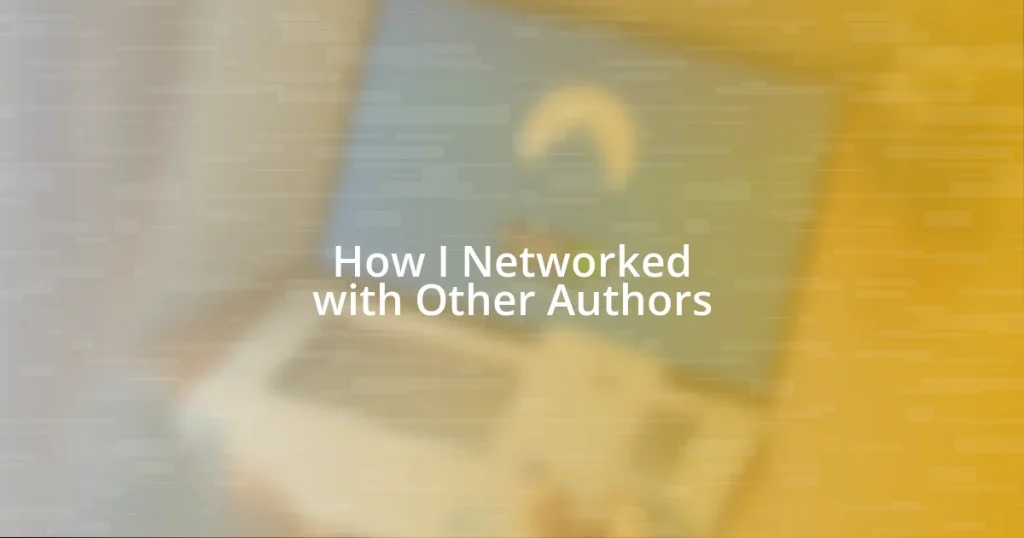Key takeaways:
- Networking with other authors creates opportunities for collaboration, emotional support, and shared experiences that enrich the writing journey.
- Utilizing social media strategically and attending author events helps forge genuine connections and enhances visibility within the writing community.
- Building and maintaining authentic relationships through reciprocity and regular follow-ups solidifies connections and fosters mutual support in the writing process.

Understanding the importance of networking
Networking is a powerful tool in any author’s journey. I recall my first writers’ conference, filled with nerves and excitement. The connections I made there not only sparked collaborations but opened doors to opportunities I’d never imagined before. Have you ever wondered how a simple conversation can lead to something transformative?
When I started networking with other authors, I discovered something invaluable: shared experiences. Authors often face similar challenges, from writer’s block to the intricacies of getting published. One evening, while chatting over coffee with a fellow author, we exchanged tips that later helped me navigate a difficult chapter in my book. It’s moments like these, that genuinely reflect the essence of networking—it’s about lifting each other up.
Moreover, networking can provide emotional support that’s often hard to find in isolation. In our solitary writing spaces, it’s easy to feel overwhelmed. I remember feeling adrift until I joined a local writing group where I found camaraderie and encouragement. Isn’t it refreshing to have a community that understands your struggles and celebrates your victories?

Identifying authors in your genre
Identifying authors in your genre can feel like embarking on an exciting treasure hunt. I remember when I first dove into research, seeking out names that resonated with my writing style. It was exhilarating to create a list of authors whose work not only inspired me but also aligned with my writing aspirations. The more I read, the more I began to see common themes in their stories, helping me identify where I fit within the genre. Have you ever stumbled upon an author whose story felt like an echo of your own?
The genre you write in dictates much of your audience and potential collaborators. I vividly recall attending a book fair where I spotted an author whose debut novel had tons of buzz. As I approached her, a wave of nervous excitement washed over me, but it quickly turned into a sense of belonging when we discovered our shared journey in the same niche. This interaction opened my eyes to the significance of identifying fellow authors not just as competitors, but as allies who can help raise the bar in our craft. The connections you make can often spark amazing ideas and even future projects.
To enhance your networking strategy, create a comparison table of authors in your genre. This not only helps you keep track of who’s who but also allows you to identify what sets your voice apart. When I did this, it became a game-changer; it was as if I was charting a roadmap of inspiration. Recognizing their styles, themes, and target audiences will empower you in your own writing journey.
| Author | Notable Works |
|---|---|
| Author 1 | Book Title 1, Book Title 2 |
| Author 2 | Book Title 3, Book Title 4 |
| Author 3 | Book Title 5, Book Title 6 |

Utilizing social media effectively
In today’s digital age, utilizing social media effectively is crucial for connecting with other authors. I’ve found that platforms like Twitter and Instagram are not just for sharing my work, but for forging genuine relationships. One meaningful connection started with a simple tweet. I shared a writing struggle, and a fellow author reached out, offering advice and encouragement. That single interaction blossomed into a supportive online friendship that I truly cherish.
To maximize your social media presence, consider these strategies:
- Be Authentic: Share your journey, struggles, and victories in a way that resonates with others.
- Engage Regularly: Comment on others’ posts and join conversations in relevant groups.
- Use Hashtags Wisely: Leverage genre-specific hashtags to connect with authors in your niche.
- Host Virtual Events: Organize live readings or Q&A sessions to interact with your audience and fellow authors.
- Share Resources: Posting articles, tips, or insights not only helps others but positions you as a valuable community member.
When I began posting regularly about my writing experiences, I noticed an increase in engagement. The feedback I received sparked new ideas and led to collaborations I hadn’t anticipated. It’s amazing how a little authenticity can go a long way in building a strong network!

Attending author events and conferences
Attending author events and conferences has been a game-changer for my networking journey. One of my most memorable experiences was the first conference I attended, where I found myself surrounded by passionate individuals who shared my love for writing. I vividly recall standing in line for coffee, striking up a conversation with a nervous debut author, just like me. That chance encounter led to deeper discussions, and we ended up sharing our work and cheering each other on before our readings. Isn’t it incredible how a simple cup of coffee can ignite connections?
At these events, I’ve learned to seize every moment. Whether it was joining a panel discussion or asking a question during a Q&A session, I always left with valuable insights and new contacts. I remember attending a workshop led by an established author who had once been in my shoes. Hearing their story was both inspiring and comforting. It reminded me that even the most successful authors started somewhere and that our paths can intersect in ways we can’t anticipate.
What I found particularly striking about these events is the palpable sense of community. There’s this unspoken understanding among attendees that we’re all in this together, striving for similar goals. I remember during a networking dinner, sharing a table with authors from various backgrounds. As we exchanged stories of struggles and victories, I felt a deep sense of camaraderie. Have you ever felt that undeniable energy when you’re surrounded by your tribe? It’s a feeling that not only validates your journey but ignites new aspirations for your own writing.

Building genuine relationships with authors
Building genuine relationships with authors requires an open heart and a willingness to be vulnerable. I remember reaching out to an author I admired, feeling nervous about how my message would be received. Surprisingly, we struck up an honest conversation about our writing insecurities. That initial outreach blossomed into a valuable mentorship that has significantly shaped my journey as a writer. Can you imagine the impact of simply being brave enough to connect?
It’s crucial to prioritize quality over quantity in these relationships. I once attended a small online writing gathering where, instead of making a dozen superficial connections, I focused on getting to know just a few authors deeply. We exchanged not just ideas about writing, but also personal challenges and aspirations. This intimate setting fostered a bond that’s grown over time; we began supporting each other’s work and even critiqued each other’s drafts. The depth of these interactions taught me that authenticity often leads to far richer connections than trying to build a massive network.
Another aspect I’ve come to value is the importance of reciprocity in these relationships. After one author generously helped me navigate a tricky publishing issue, I realized I needed to pay that kindness forward. So, I offered to read their manuscript and give feedback. That exchange not only reinforced our bond but also created a mutual support system that keeps evolving. Have you considered how your own experiences can serve as a bridge to deeper connections with fellow writers?

Collaborating on projects with authors
Collaborating on projects with fellow authors has opened unexpected doors in my writing journey. I vividly remember when I teamed up with a group of authors to create an anthology. We each contributed a short story centered around a common theme. Not only did it challenge me to step outside my usual writing style, but it also resulted in a publication that we were all proud to promote together. Isn’t it exhilarating to see your name alongside others you respect?
Through these collaborative projects, I’ve discovered the power of blending different writing voices. I recall one instance where I partnered with an author known for their humor, while my strength lay in reflective, emotional prose. As we worked together, we found a delightful balance, creating a narrative that resonated with a wider audience than either of us could achieve alone. Have you ever experienced that magic when two distinct styles come together to create something unique?
Collaboration also fosters accountability and motivation. I have always found that when you’re part of a team, there’s a certain energy that propels you forward. During a joint workshop, we set deadlines for our individual pieces, knowing we’d be sharing them with one another. That gentle push encouraged me to meet my goals, and the excitement of sharing our progress was contagious. How often do you find that working with others can uplift your own writing process?

Following up and maintaining connections
Maintaining connections after the initial outreach can truly deepen your writing journey. I remember sending a simple follow-up message to an author I had met at a local book fair. At first, I was nervous about how they would respond, but that casual note led to a casual coffee chat over Zoom. We discussed our current projects, and I learned invaluable insights about their publishing experiences. There’s something so enriching about revisiting those conversations, don’t you think?
Regular check-ins can really solidify the connections you’ve made. I try to send an email every few months to the authors I’ve connected with, sharing something I found that might interest them, whether it’s an article on writing or news about an event they might enjoy. It’s a small gesture, but it shows I care about their journey too. I once got a lovely reply from another author, saying my message brightened her day and helped get her through a tough writing block. Isn’t it amazing how a few words can uplift someone when they least expect it?
Engaging on social media is another effective way to maintain these literary relationships. I often hop onto Twitter or Instagram to comment on posts or share thoughts about their latest book. Recently, I shared a photo of their new release with a personal note about what it meant to me. They ended up responding, which led to a fun exchange about our writing processes. Have you tapped into the power of social media for nurturing these connections? It can be a game changer in keeping your network active and thriving.















